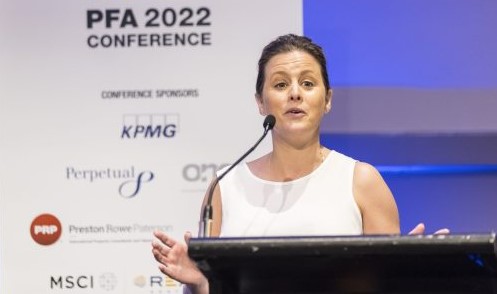Look through proptech hype to deliver real value – tips from Charter Hall’s Sheridan Ware
 Investment in property technology (proptech) is on the rise, yet sorting the wheat from the chaff is a challenge, according to Sheridan Ware, Chief Information & Technology Officer at Charter Hall, who presented at the PFA 2022 Conference in Cairns.
Investment in property technology (proptech) is on the rise, yet sorting the wheat from the chaff is a challenge, according to Sheridan Ware, Chief Information & Technology Officer at Charter Hall, who presented at the PFA 2022 Conference in Cairns.
“Proptech solutions exist for almost every aspect on how we acquire, develop and manage a building, and help us provide greater certainty, efficiency, tenant experience, wellbeing and governance.”
“But there is a lot of hype and we need to be clear on the benefits we are trying to achieve so we’re not just employing technology for technology’s sake.”
Ms Ware said proptech adoption has traditionally been highest in the building management and property development stages of the lifecycle, but use of proptech in investment management is on the rise.
Despite Australia lagging other global markets in leveraging emerging technologies, COVID-19 has provided property owners with a unique opportunity to reframe their use of technology, with Charter Hall leveraging technology to adapt to the challenges posed by the pandemic and beyond.
She recounted how Charter Hall were able to use their existing technology in the initial stages of the pandemic to support tenant rent relief, provide virtual inspections, connect with their building communities through their Charli app and counteract the increased threat of cyber attack.
As people have started returning to offices, Ware said technology continues to play an important role:
“It’s important people feel safe in the office. You have no idea how many things you touch on an average day and we are using technology to reduce those touch points, while also managing air quality and air flow.”
“We also need to provide an experience which makes the commute worthwhile so we’ve shifted the focus beyond basic occupancy analytics to understand how space is used so we can provide more of the spaces that people want.”
In the immediate term the proptech world is likely to be focused on hybrid working, wellbeing, automation and sustainability, where Australia is well placed to lead.
“We won’t get to net zero without technology, and there are many ways to drive outcomes by analysing and reducing use of embodied carbon, energy use and more.”
Further afield, Ware’s team is tracking several emerging trends including the rise of self-aware buildings, the impact of the metaverse, and the growing use of emotional technology which will pose ethical challenges around the use of people’s personal data.
But for now, she offered the following tips for navigating the increasingly complicated proptech world and for assessing how well companies are adopting new technologies:
• Look for outcomes not technology: Separate the talkers from the doers by understanding what outcomes they have achieved by investing in technology.
• Check for the scale of those outcomes: Look for whether they are driving those outcomes in a single smart building or across their portfolio of assets, which is where the true value lies.
• Ask questions about whose interests are being served: Look for companies with a strong ethical grounding who are considering the ramifications of how they use technology on people’s privacy. “Just because we can use technology, doesn’t mean we should.”
• Exercise caution when investing directly in proptech companies: The proptech space is crowded and there is a high failure rate of amongst start-ups, so consider any direct investments carefully or work through a specialised venture capitalist.
